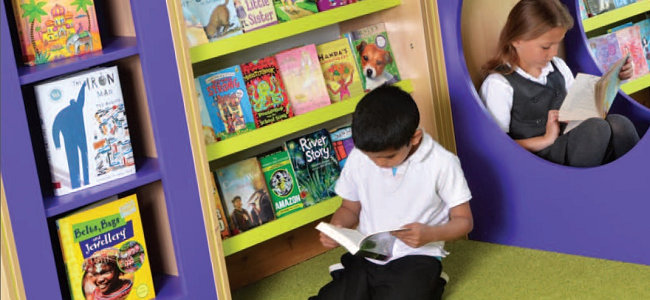Oaka Books, a UK publisher specialising in SEN resources, is launching its new digital resource packs for dyslexic students and visual learners at the TES SEN show on 7th and 8th October in London. This digital resource library will make Oaka topic packs accessible to up to 300 pupils per school at a cost of around 1p per pack per pupil for the year.
As a child, I was actively encouraged to read. I’d spend evenings going to bed reading about the Mary Lennox, the isolated and closed off child sent to live in a remote manor on the desolate moors of Yorkshire, or about Carrie, the evacuee who embarks on a new adventure to Wales to escape the bombing of London. The skill of the authors hooked me into reading further about their experiences. I felt myself being transported into the fresh valleys of Wales, where Carrie would spend time weighing out rationed items in the shop, and experienced the difference in social classes in Victorian England alongside their understanding of medical ailments.
As a dad of eight, preparation for World Book Day starts early in my house. Unfortunately, the 'early' assertion usually relates to the morning of the day itself, with my wife and I rifling through the fancy dress box to match outfits to much-loved book characters for our children to wear. While lack of forethought is undoubtedly quite remiss on my part, I work in children's publishing, and so the annual event should have long since ceased to creep up and surprise me. I do love the whirlwind of chaos that results from trying to conceive plausible outfits that look like favourite book protagonists. In an instant, an oversized black coat becomes a wizard's cloak, and a smattering of face paint transforms a child wearing an orange t-shirt into the Cheshire cat.
About 5% of children will have experienced the death of a parent by the time they are 16, while 92% will lose someone important to them. At any one time, around 70% of schools have a bereaved pupil in their care, according to Child Bereavement UK. When the worst happens, teachers provide an invaluable source of support, guidance and care for their pupils. Just being there, ready to listen and support your pupils in times of tragedy is vital. Children find it distressing to see their parents upset and they need teachers, classroom assistants and mentors to be strong and provide reassurance through this difficult period in their lives.
A good environment for reading is probably just as important as the book itself. Jane Jackson, marketing manager at BookSpace, shares her top tips on how to create the ultimate reading-zone.

Creating a school reading culture is high up on most headteachers’ wish lists. But presenting reading as an attractive offer isn’t always that easy. While most young people find electronic media instantly attractive so motivation is not an issue, we have to work much harder to make books appealing.
What can bespoke quizzes offer the classroom? School librarian and trained quiz writer Kate Barton discusses how best to go about creating these activities for your classroom.

For over six years I’ve used an educational software program which quizzes school students on books they have read. The quizzes are designed to measure to what extent readers have understood the books, and ensure that their choices are both enjoyable and suitably challenging for them.
Most staff rooms will be home to a widely-diverse range of reading habits and tastes; as adult readers, we all know there’s no such thing as good or bad readers – or in fact good or bad books. We know it’s not about measuring people by their reading skills, or the number of prizewinning books they read. It’s simply about what we each, as individuals, like to read and how it makes us feel. We can have the most dismal reading experience from a book that has been praised to the roof tops – and equally we can have the best experience from something that others might consider to be ‘trashy’, ‘lightweight’ or ‘inferior’. In the end, the best book is the world is the one we, ourselves, like best – and that can change by day, by week or by year.

I wanted to create a simple list of what I view in my humble opinion as the best books for teachers out there in the market. I thought of two key factors: ‘philosophy’ and ‘practicality’. By ‘philosophy’ I mean those books that get us thinking deeply about our role and our pedagogy – books that reinvigorate our passions and spark new thinking. ‘Practicality’ is self-explanatory but essential for the best educational books for teachers. If a book gets you scribbling notes furiously or splashing each page with post-it notes then its usefulness is clear. The selection is in order numerically, but that doesn’t indicate any order of priority of quality:

A community-driven platform for showcasing the latest innovations and voices in schools
Pioneer House
North Road
Ellesmere Port
CH65 1AD
United Kingdom